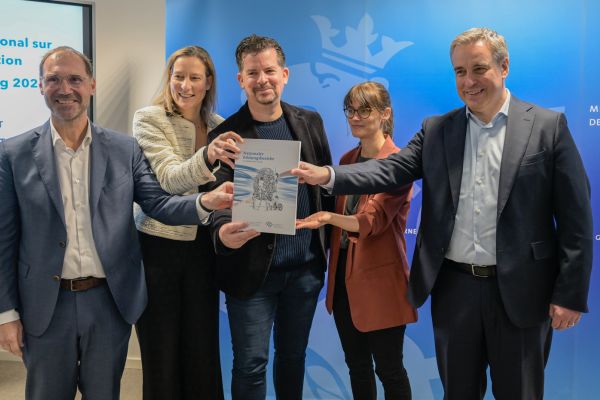 (L-R) Prof. Jens Kreisel, University of Luxembourg Rector; Dr Sonja Ugen, LUCET Director; Dr Thomas Lenz, Research Portfolio Manager; Dr Susanne Backes, Research Scientist; Claude Meisch, Luxembourg's Minister of Education, Children & Youth;
Credit: MENEJ
(L-R) Prof. Jens Kreisel, University of Luxembourg Rector; Dr Sonja Ugen, LUCET Director; Dr Thomas Lenz, Research Portfolio Manager; Dr Susanne Backes, Research Scientist; Claude Meisch, Luxembourg's Minister of Education, Children & Youth;
Credit: MENEJ
On Monday 9 December 2024, Luxembourg's Ministry of Education, Children and Youth and the University of Luxembourg jointly presented the fourth National Education Report.
Produced every three years since 2015 and based on a multidimensional approach (pedagogical, psychological, linguistic and sociological), this report takes an analytical look at the opportunities and challenges facing the Luxembourg education system. Co-published by the ministry's Service for the Coordination of Pedagogical and Technological Research and Innovation (SCRIPT) and the Luxembourg Centre for Educational Testing (LUCET) of the University of Luxembourg, the report is a compilation of scientific articles and research work that provides scientific support for the implementation of educational policy and the evaluation of reforms launched by the ministry.
The report found that the diversity of the school population remains a major challenge. It confirmed that Luxembourg has an ever-increasing heterogeneity of its school population, linked to the migratory and linguistic context, and to socio-economic status.
According to the report, the goal of adapting the education system to make it more equitable and to give all children and young people the best possible chances of success has guided educational policy and the reforms implemented for years. Nevertheless, heterogeneity remains the greatest challenge of the education system, which led the authors of the 2024 report to focus specifically on the themes of diversity and inclusion.
Luxembourg's Minister of Education, Children and Youth, Claude Meisch, stated: "Diversity and inclusion are a permanent challenge for educational policy, but also for all those who work with children and young people. The National Report on Education has the merit of highlighting the multiple facets of this subject so that we can gradually adapt our system to our heterogeneous school population."
The 2024 report confirmed results from four major initiatives designed to gradually reduce educational inequalities:
1. Early childhood: To give all children the best chances in life and at school, the report stated that action must begin in early childhood. The government noted it is planning to put forward measures to strengthen the accessibility of education and care structures, and the quality of supervision from early childhood. To respond to linguistic diversity and to offer each child appropriate educational opportunities from an early age, the ministry introduced, in 2017, a multilingual education programme for children aged one to four in daycare centres. They also benefit from free supervision of 20 hours per week. There are also plans to increase the staff/child ratio in daycare centres, a full-time offer for early education in all municipalities and the introduction of an additional teacher in cycle 1, to adapt teaching to the children’s needs.
2. Public European schools: The ministry has established six public European schools over the last seven years. These schools are reported to offer more equitable chances of success to the diverse school population, using a flexible language learning approach based on linguistic ability being an important factor in academic success. The report also confirmed the preliminary results of an analysis showing that European schools could effectively contribute to reducing existing educational inequalities. The analysis found that pupils in the European system have less academic delay than pupils in the national system. It noted that pupils are less likely to change track, they follow a more linear path and obtain better results in mathematical skills in standardised tests. The results reportedly support the advantage for students of learning a subject in a language of which they have a good command.
3. Alpha project: The report underlined that literacy is a key component for a successful school career. To reduce inequalities linked to linguistic diversity, the ministry intends to also offer students the choice of German or French literacy programmes in public primary schools. The pilot project "Alpha – zesumme wuessen" (grow together) launched at the start of the 2022/2023 school year in four primary schools. The group of students who have French as their literacy language reportedly showed a strong motivation to learn and read in French. The first analyses showed the potential of this project to better respond to the linguistic diversity of the school population.
4. Visual impairment screening: The report also found that visual impairments have a significant impact on students' learning and academic performance. LUCET and the Centre for the Development of Vision Skills (CDV) have developed a screening procedure integrated into standardised tests (ÉpStan). Results of the standardised tests in cycle 2.1 indicated that children with visual impairments have significantly lower results in the three skill areas (early literacy, mathematics and oral comprehension). This systematic screening reportedly allows the early identification of at-risk students, adapting interventions to their needs and contributing to improving their chances of success.
The ministry added that it will gradually increase the number of socio-therapeutic centres (CST), providing primary school pupils with socio-emotional development disorders with individual and intensive educational support from pedagogues, therapists and teachers. This offer will also be extended to secondary school pupils.
The ministry is also expected to set up more socio-professional integration centres (CISP) in different regions of the country. These provide support for young people at the academic level, but above all at the socio-educational level to strengthen social, emotional and professional skills.








